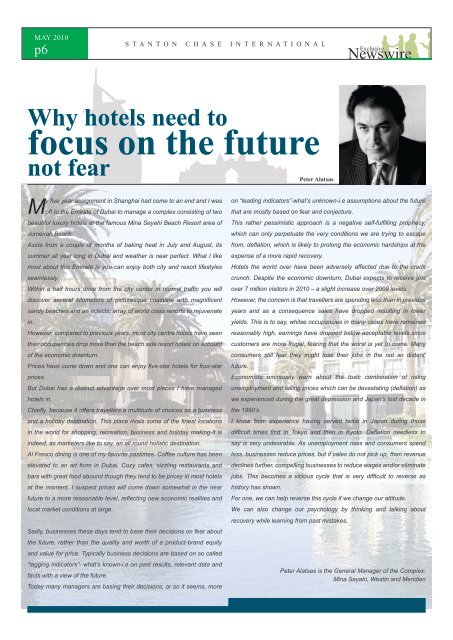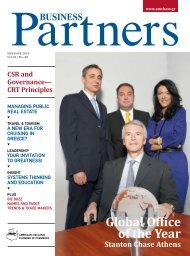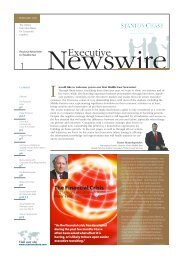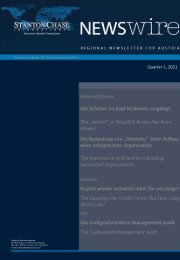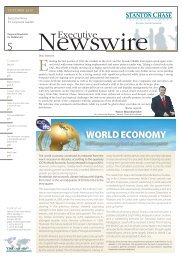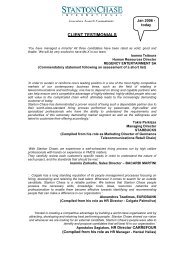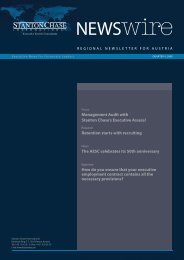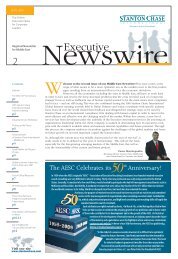Middle East - Stanton Chase International
Middle East - Stanton Chase International
Middle East - Stanton Chase International
Create successful ePaper yourself
Turn your PDF publications into a flip-book with our unique Google optimized e-Paper software.
MAY 2010<br />
p6<br />
My five year assignment in Shanghai had come to an end and I was<br />
off to the Emirate of Dubai to manage a complex consisting of two<br />
beautiful luxury hotels at the famous Mina Seyahi Beach Resort area of<br />
Jumeirah Beach.<br />
Aside from a couple of months of baking heat in July and August, its<br />
summer all year long in Dubai and weather is near perfect. What I like<br />
most about this Emirate is you can enjoy both city and resort lifestyles<br />
seamlessly.<br />
Within a half hours drive from the city center in normal traffic you will<br />
discover several kilometers of picturesque coastline with magnificent<br />
sandy beaches and an eclectic array of world class resorts to rejuvenate<br />
in.<br />
However, compared to previous years, most city centre hotels have seen<br />
their occupancies drop more than the beach side resort hotels on account<br />
of the economic downturn.<br />
Prices have come down and one can enjoy five-star hotels for four-star<br />
prices.<br />
But Dubai has a distinct advantage over most places I have managed<br />
hotels in.<br />
Chiefly, because it offers travellers a multitude of choices as a business<br />
and a holiday destination. This place rivals some of the finest locations<br />
in the world for shopping, recreation, business and holiday making-it is<br />
indeed, as marketers like to say, an all round holistic destination.<br />
Al Fresco dining is one of my favorite pastimes. Coffee culture has been<br />
elevated to an art form in Dubai. Cozy cafes, sizzling restaurants and<br />
bars with great food abound though they tend to be pricey in most hotels<br />
at the moment. I suspect prices will come down somewhat in the near<br />
future to a more reasonable level, reflecting new economic realities and<br />
local market conditions at large.<br />
Sadly, businesses these days tend to base their decisions on fear about<br />
the future, rather than the quality and worth of a product-brand equity<br />
and value for price. Typically business decisions are based on so called<br />
“lagging indicators”- what’s known-i.e on past results, relevant data and<br />
facts with a view of the future.<br />
Today many managers are basing their decisions, or so it seems, more<br />
STANTON CHASE INTERNATIONAL<br />
Why hotels need to<br />
focus on the future<br />
not fear Peter Alatsas<br />
Exclusive<br />
Newswire<br />
on “leading indicators”-what’s unknown-i.e assumptions about the future<br />
that are mostly based on fear and conjecture.<br />
This rather pessimistic approach is a negative self-fulfilling prophecy,<br />
which can only perpetuate the very conditions we are trying to escape<br />
from, deflation, which is likely to prolong the economic hardships at the<br />
expense of a more rapid recovery.<br />
Hotels the world over have been adversely affected due to the credit<br />
crunch. Despite the economic downturn, Dubai expects to receive just<br />
over 7 million visitors in 2010 – a slight increase over 2009 levels.<br />
However, the concern is that travellers are spending less than in previous<br />
years and as a consequence sales have dropped resulting in lower<br />
yields. This is to say, whilse occupancies in many cases have remained<br />
reasonably high, earnings have dropped below acceptable levels since<br />
customers are more frugal, fearing that the worst is yet to come. Many<br />
consumers still fear they might lose their jobs in the not so distant’<br />
future.<br />
Economists ominously warn about the toxic combination of rising<br />
unemployment and falling prices which can be devastating (deflation) as<br />
we experienced during the great depression and Japan’s lost decade in<br />
the 1990’s.<br />
I know from experience having served twice in Japan during those<br />
difficult times first in Tokyo and then in Kyoto. Deflation needless to<br />
say is very undesirable. As unemployment rises and consumers spend<br />
less, businesses reduce prices, but if sales do not pick up, then revenue<br />
declines further, compelling businesses to reduce wages and/or eliminate<br />
jobs. This becomes a vicious cycle that is very difficult to reverse as<br />
history has shown.<br />
For one, we can help reverse this cycle if we change our attitude.<br />
We can also change our psychology by thinking and talking about<br />
recovery while learning from past mistakes.<br />
Peter Alatsas is the General Manager of the Complex:<br />
Mina Seyahi, Westin and Meridien


